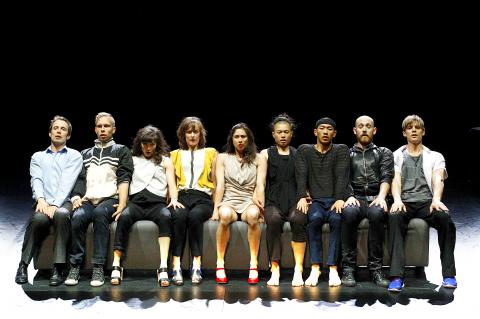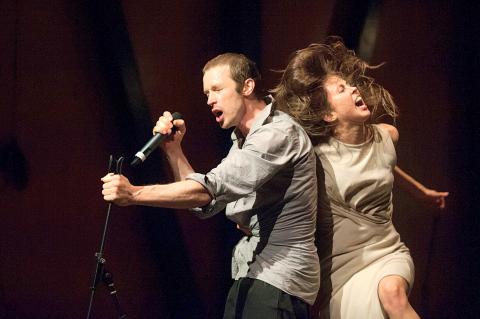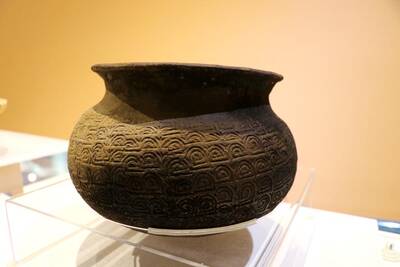The Melbourne-based contemporary dance troupe Chunky Move is back in Taipei, five years after wowing audiences during its Taiwan premiere with performances of the award-winning Mortal Engine.
That show, created by Gideon Obarzanek, who founded Chunky Move in 1995, was a technology-driven piece that combined dance, video and laser projections to explore the relationship between movement and technology. It was a visually stunning morphing of live performances with computerized magic.
Back again at the invitation of the National Theater Concert Hall (NTCH) as part of its Dancing in Autumn series, the troupe has returned with Complexity of Belonging, choreographed and directed by Dutch choreographer Anouk van Dijk, who took over as artistic director from Obarzanek in 2012.

Photo Courtesy of J Busby
For Complexity of Belonging, which premiered in October last year as the flagship show of the Melbourne Festival, van Dijk joined forces with one of her longtime collaborators, German playwright and director Falk Richter, who wrote the text and codirected the production, for a piece that is more dance theater than pure dance.
Richter has been director in residence at the Schaubuhne am Lehniner Platz in Berlin since 2000. He met van Dijk at a festival in Hamburg and have been working together since 1999. Their first production was Nothing Hurts; Complexity of Belonging is their fourth show.
The show is a dark, but humorous, exploration of identity in the age of social media and constant change, raising questions about gender, nationality, sexuality and history in an ever-more connected globalized society.

Photo Courtesy of Sarah Walker
The cast is made up of five dancers and four actors, but all act and dance, in monologues, and dramatic scenes, with choreographed sections sometimes standing alone and sometimes dance in parallel with the theater action.
The nine portray fictional characters, all expatriates and therefore out of place, but use their own names and some of the stories come from their own lives that they discussed during workshop sessions with Richter, thereby blurring the line between fact and fiction.
Tying the characters’ stories together is a French researcher, portrayed by Eloise Mignon, who is interviewing subjects about the nature of belonging, relationships and community for an art installation piece. The story line is built around the questions of belonging, assimilation and how to create and maintain intimate relationships across vast distances. The backdrop picture of the Australian Outback provides a vivid representation of space and distance.
Part therapy session, part physical exploration, the show raises questions that will resonate with audiences even if they have never left home — everyone has had to try to fit in at some point in life.
Richter has built a reputation for works that focus on dislocation, corporatization and rootlessness, while van Dijk’s choreography often stresses loss of control and instability, so it is easy to see why they would be interested in the issues raised by Complexity of Belonging.
The show runs about 100 minutes, with no intermission and due to the sometimes coarse language, there is an age advisory of 15 years and up. The show is in English with Chinese surtitles. There will be a post-show talk in the lobby of the National Theater after the Sunday matinee.
This year’s Dancing in Autumn series wraps up with Taiwanese choreographer Huang Yi’s (黃翊) Objects & Under the Horizon (物&地平面以下) starting on Dec. 3. All five shows are already sold out.
Performance Notes
WHAT: Complexity of Belonging
WHEN: Tonight and tomorrow at 7:45pm, tomorrow and Sunday at 2:45pm
WHERE: National Theater (國家戲劇院), 21-1 Zhongshan S Rd, Taipei City (台北市中山南路21-1號)
ADMISSION: NT$500 TO NT$2,500; available at NTCH box offices, online at www.artsticket.com.tw and at convenience store ticketing kiosks

Sept. 1 to Sept. 7 In 1899, Kozaburo Hirai became the first documented Japanese to wed a Taiwanese under colonial rule. The soldier was partly motivated by the government’s policy of assimilating the Taiwanese population through intermarriage. While his friends and family disapproved and even mocked him, the marriage endured. By 1930, when his story appeared in Tales of Virtuous Deeds in Taiwan, Hirai had settled in his wife’s rural Changhua hometown, farming the land and integrating into local society. Similarly, Aiko Fujii, who married into the prominent Wufeng Lin Family (霧峰林家) in 1927, quickly learned Hoklo (commonly known as Taiwanese) and

The low voter turnout for the referendum on Aug. 23 shows that many Taiwanese are apathetic about nuclear energy, but there are long-term energy stakes involved that the public needs to grasp Taiwan faces an energy trilemma: soaring AI-driven demand, pressure to cut carbon and reliance on fragile fuel imports. But the nuclear referendum on Aug. 23 showed how little this registered with voters, many of whom neither see the long game nor grasp the stakes. Volunteer referendum worker Vivian Chen (陳薇安) put it bluntly: “I’ve seen many people asking what they’re voting for when they arrive to vote. They cast their vote without even doing any research.” Imagine Taiwanese voters invited to a poker table. The bet looked simple — yes or no — yet most never showed. More than two-thirds of those

In the run-up to the referendum on re-opening Pingtung County’s Ma-anshan Nuclear Power Plant last month, the media inundated us with explainers. A favorite factoid of the international media, endlessly recycled, was that Taiwan has no energy reserves for a blockade, thus necessitating re-opening the nuclear plants. As presented by the Chinese-language CommonWealth Magazine, it runs: “According to the US Department of Commerce International Trade Administration, 97.73 percent of Taiwan’s energy is imported, and estimates are that Taiwan has only 11 days of reserves available in the event of a blockade.” This factoid is not an outright lie — that

The People’s Republic of China (PRC) yesterday paraded its military hardware in an effort to impress its own population, intimidate its enemies and rewrite history. As always, this was paced by a blizzard of articles and commentaries in the media, a reminder that Beijing’s lies must be accompanied by a bodyguard of lies. A typical example is this piece by Zheng Wang (汪錚) of Seton Hall in the Diplomat. “In Taiwan, 2025 also marks 80 years since the island’s return to China at the end of the war — a historical milestone largely omitted in official commemorations.” The reason for its